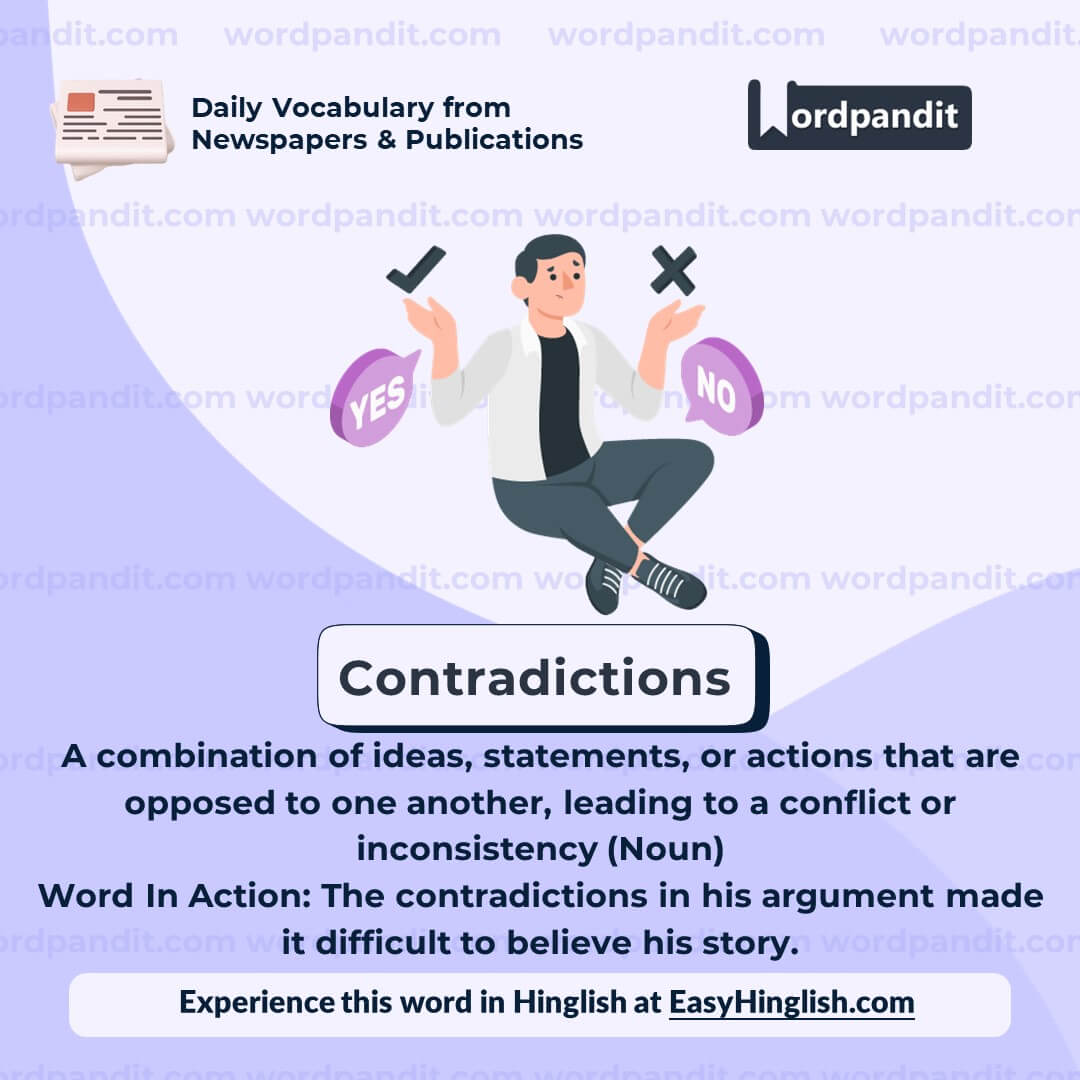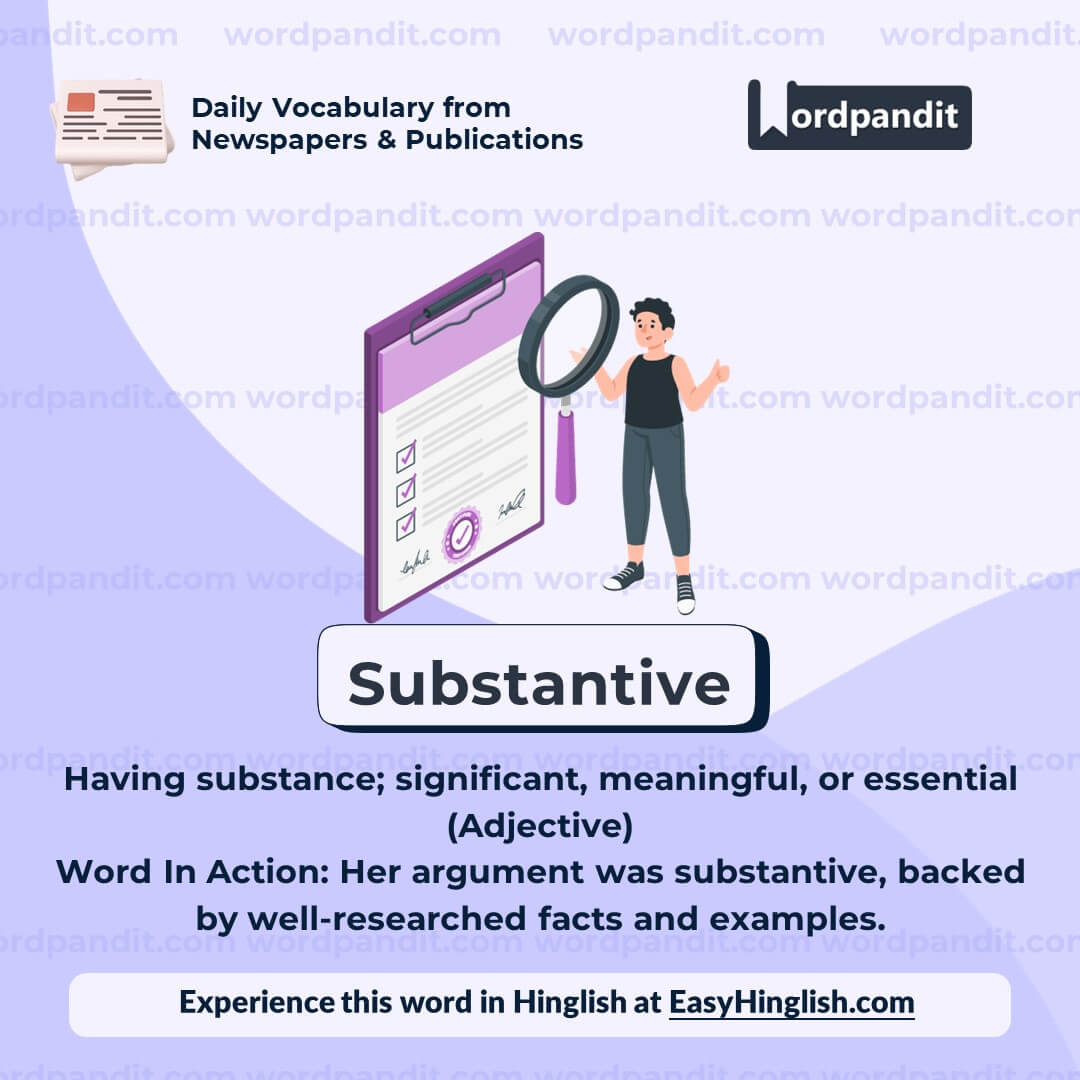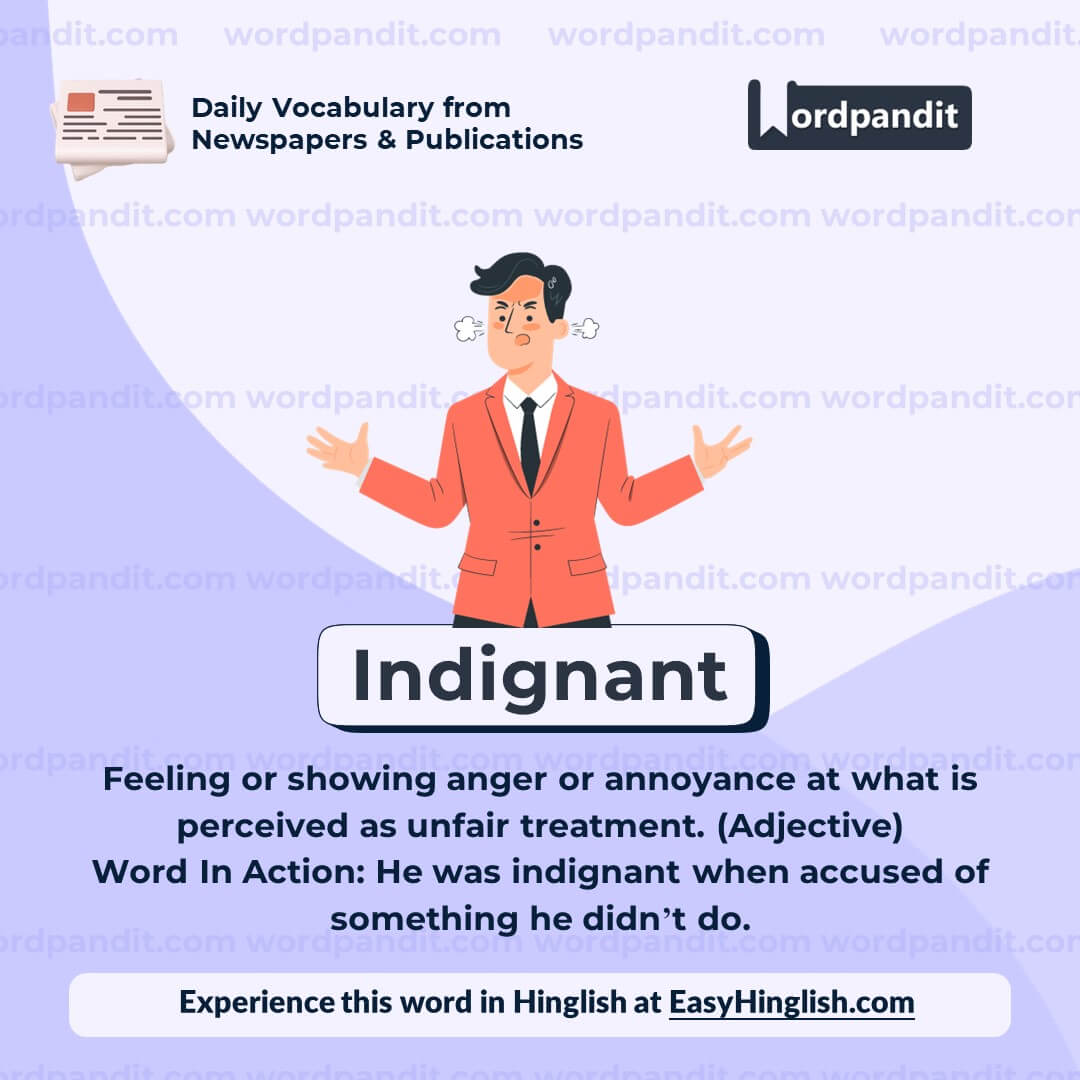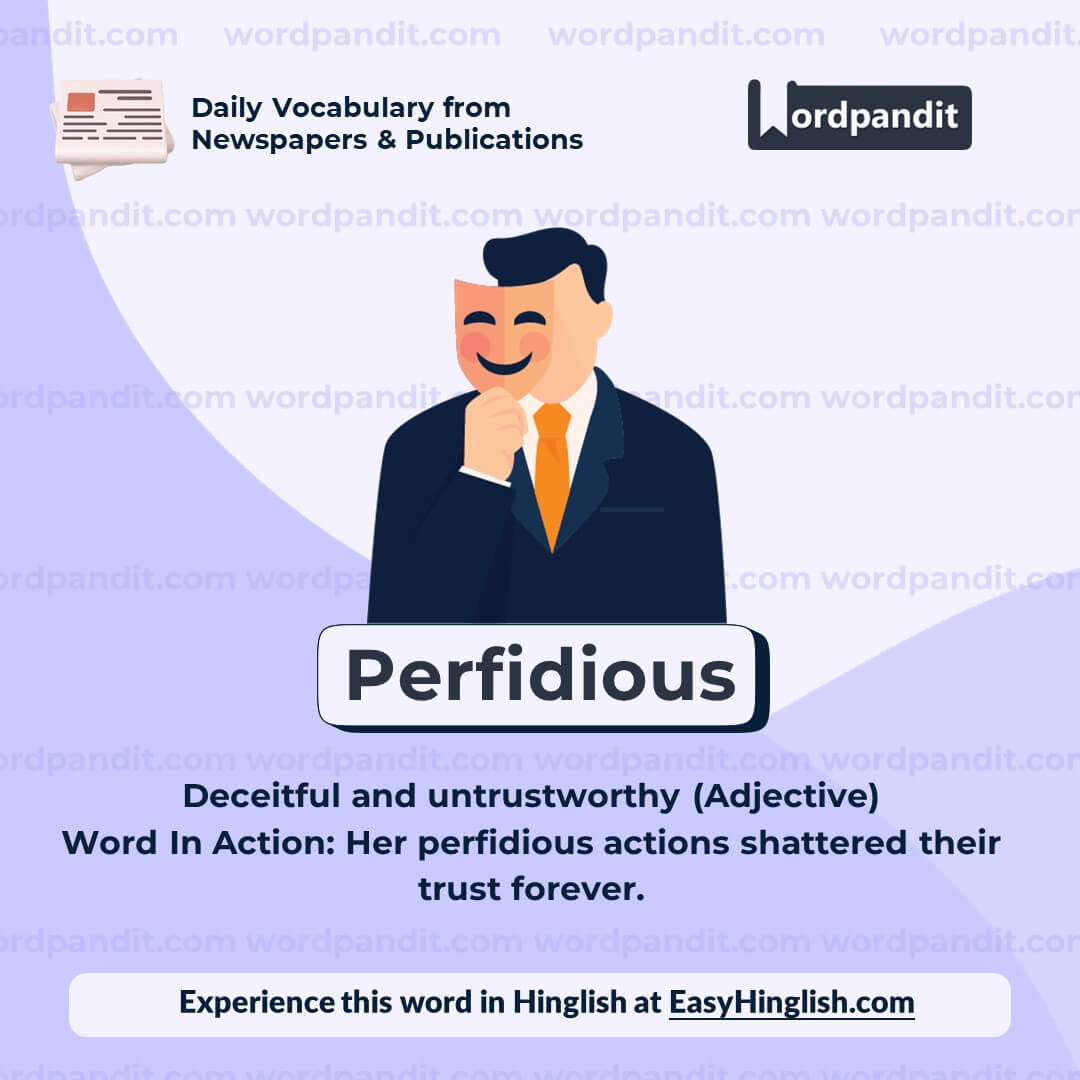Daily Vocabulary from International Newspapers and Publications
Expand Your Vocabulary with Wordpandit’s Global Vocabulary Hub
At Wordpandit, we are committed to helping you develop a truly global vocabulary by drawing from some of the most respected international publications. This section is designed to keep you ahead of the curve by introducing you to words that define global conversations and trends.
The Power of Global Sources
To help you think and communicate on a global scale, we curate vocabulary from renowned international sources, such as:
- The New York Times
- The Washington Post
- BBC
- The Guardian
- The Economist
- Scientific American
- Psychology Today
- And many more...
Stay Global, Stay Competitive
Our daily updates from international publications ensure you are consistently exposed to new words that reflect global news and developments, making sure your vocabulary is not only current but also globally relevant.
Enhance Your Global Perspective
Whether you’re preparing for international exams, aiming to excel in global business communication, or want to enhance your language skills for personal growth, Wordpandit offers the resources you need to thrive in a global context.
Effective Learning, Global Reach
Our learning methodology combines global examples, memory aids, and interactive activities, allowing you to internalize new words effectively and apply them in real-world scenarios.
Begin Your Global Vocabulary Journey Now!
Why Choose Wordpandit?
Practical Learning: Focus on words you'll actually encounter in real-world reading, enhancing your comprehension and communication skills.
Diverse Content: From current affairs to scientific breakthroughs, our varied sources expose you to vocabulary across multiple domains.
Effortless Integration: Make Wordpandit a part of your daily routine. Just a few minutes each day can significantly boost your lexicon over time.
Your Path to Vocabulary Mastery
- Visit our Daily Vocabulary section regularly
- Explore new words and their usage in context
- Practice incorporating these words into your own writing and speech
- Track your progress as your vocabulary expands
Start Your Journey Today
Embark on your vocabulary enhancement journey with Wordpandit. By consistently engaging with our daily posts, you'll build a robust vocabulary that serves you well in academic, professional, and personal contexts.
Remember, a word a day keeps linguistic limitations at bay. Make Wordpandit your daily companion in the quest for vocabulary excellence!
WORD-1: Discursive
Context:
"Written in a ‘complex and discursive style’ not meant to simplify the contradictions and complexities that were present in the story" - Aeon
Explanatory Paragraph:
The term "discursive" refers to a style of communication or writing that moves from topic to topic in an expansive and sometimes meandering way. It often involves detailed discussions, analysis, and exploration of various subjects rather than a straightforward, concise approach. While it may seem tangential, a discursive style is valuable for unpacking intricate ideas and delving into their nuances.
Meaning: Moving from one topic to another in a detailed, often digressive manner (Adjective)
Pronunciation: dis-KUR-siv
Difficulty Level: ⭐⭐⭐ Intermediate
Etymology: Derived from the Latin word "discursus," meaning "running about" or "discourse."
Synonyms & Antonyms:
Synonyms: Rambling, digressive, wandering, meandering
Antonyms: Concise, succinct, focused
Usage Examples:
- The professor's discursive lecture covered a wide range of topics, leaving the students both overwhelmed and intrigued.
- The novel's discursive narrative style mirrors the complexity of its characters' inner lives.
- During the meeting, his discursive comments often veered away from the main agenda, though they were thought-provoking.
- Her discursive essays are appreciated for their depth, even if they lack brevity.
Cultural Reference:
"Discursive styles are common in literary classics where authors prioritize exploration over direct storytelling, as seen in works by authors like Virginia Woolf." - Literature Review Journal
Think About It:
How can a discursive style of writing enhance our understanding of complex subjects, and when might it become a hindrance?
Quick Activity:
Write a short discursive paragraph on a topic of your choice. Allow your ideas to flow freely and explore related subjects before circling back to your main point.
Memory Tip:
Think of "discursive" as "discussing extensively." It helps to imagine a conversation that roams freely across ideas rather than sticking to a single point.
Real-World Application:
Discursive writing is often used in academic papers, opinion editorials, and philosophical works where exploring multiple facets of a subject is necessary for a comprehensive understanding.
WORD-2: Contradictions
Context:
"Written in a ‘complex and discursive style’ not meant to simplify the contradictions and complexities that were present in the story" - Aeon
Explanatory Paragraph:
The word "contradictions" refers to situations or statements in which two or more opposing ideas, actions, or conditions coexist, often creating a sense of conflict or inconsistency. Contradictions can occur in arguments, beliefs, or even within an individual’s thoughts or actions, highlighting the inherent complexity of human nature and reality.
Meaning: A combination of ideas, statements, or actions that are opposed to one another, leading to a conflict or inconsistency (Noun)
Pronunciation: kon-truh-DIK-shuns
Difficulty Level: ⭐⭐ Basic
Etymology: From the Latin "contradictio," meaning "speaking against," derived from "contra" (against) and "dicere" (to speak).
Synonyms & Antonyms:
Synonyms: Inconsistencies, conflicts, discrepancies, paradoxes
Antonyms: Agreements, consistencies, harmonies
Usage Examples:
- The contradictions in her testimony made it difficult to trust her account of events.
- Philosophers often explore the contradictions inherent in human behavior to better understand morality.
- The politician's speech was filled with contradictions, promising lower taxes while increasing public spending.
- Art often reflects the contradictions of society, capturing both its beauty and its flaws.
Cultural Reference:
"Contradictions lie at the heart of many philosophical debates, such as the duality of good and evil in Dostoevsky's novels." - Literary Analysis Weekly
Think About It:
Why do contradictions often lead to deeper understanding rather than mere confusion? How can they be resolved in meaningful ways?
Quick Activity:
Identify and list three contradictions you observe in daily life, whether in conversations, media, or your own thoughts. Reflect on what they reveal about the situations they arise from.
Memory Tip:
Think of "contradictions" as "contra" (against) and "dictions" (statements)—ideas or statements that speak against each other.
Real-World Application:
Understanding contradictions is essential in fields like law, ethics, and science, where resolving inconsistencies leads to progress and clarity.
WORD-3: Substantive
Context:
"It is no wonder that the substantive conclusions argued by Pocock remain relatively opaque or misunderstood." - Aeon
Explanatory Paragraph:
The word "substantive" refers to something that has a firm basis in reality, is meaningful, and significant rather than superficial. It implies depth, importance, or essence in a particular subject or argument.
Meaning: Having substance; significant, meaningful, or essential. (Adjective)
Pronunciation: sub-stan-tiv
Difficulty Level: ⭐⭐⭐ Intermediate
Etymology: Originating in late Middle English, from Old French substantif or Latin substantivus, meaning 'of substance' or 'essential'.
Synonyms & Antonyms:
Synonyms: Significant, meaningful, essential, fundamental, core
Antonyms: Superficial, trivial, insubstantial, minor, negligible
Usage Examples:
- The substantive issues of the debate were overshadowed by the candidates' personal attacks.
- Her report provided substantive insights into the company's financial challenges.
- Without substantive evidence, the case was dismissed by the court.
- They held a substantive discussion on climate change policies during the summit.
Cultural Reference:
"In literature, a substantive theme is one that delves deeply into the human condition, such as love, loss, or morality." - Adapted from critical analyses of Shakespeare's works
Think About It:
How can you differentiate between substantive discussions and superficial ones in your daily conversations?
Quick Activity:
Identify a substantive argument in a recent article or book you read. Write a brief summary explaining why it is substantive.
Memory Tip:
Think of "substance" as the core or essence of something. Substantive arguments have "substance" and are essential or meaningful.
Real-World Application:
"Substantive" is often used in professional contexts, such as law, politics, or academia, to highlight points or arguments that carry significant weight or impact.
WORD-4: Indignant
Context:
"It was a year when indignant Vishva Hindu Parishad (VHP) members moved the Calcutta high court against a perfidious case of love jihad: apparently a lioness named Sita was being housed with a lion called Akbar in the Siliguri Safari Park." - BBC
Explanatory Paragraph:
The word "indignant" describes a strong feeling of anger or annoyance provoked by something perceived as unfair or unjust. It reflects an emotional response to perceived wrongdoing or insult.
Meaning: Feeling or showing anger or annoyance at what is perceived as unfair treatment. (Adjective)
Pronunciation: in-dig-nuhnt
Difficulty Level: ⭐⭐⭐ Intermediate
Etymology: Originating in late 16th century from Latin "indignari," meaning ‘regard as unworthy.’ Derived from "in-" (not) and "dignus" (worthy).
Synonyms & Antonyms:
Synonyms: Angry, resentful, outraged, irritated, annoyed
Antonyms: Content, pleased, satisfied, calm, indifferent
Usage Examples:
- The students were indignant when their teacher accused them of cheating without evidence.
- She wrote an indignant letter to the company after receiving poor customer service.
- His indignant tone made it clear he did not agree with the decision.
- The workers were indignant about the sudden layoffs announced without notice.
Cultural Reference:
"In the novel 'Pride and Prejudice' by Jane Austen, Elizabeth Bennet often feels indignant when she encounters Mr. Darcy's arrogance and initial dismissal of her family." - Literary Analysis
Think About It:
What situations in your life have made you feel indignant, and how did you respond?
Quick Activity:
Write a short paragraph about a situation where someone might feel indignant and explain why.
Memory Tip:
Think of the "dig" in "indignant" as someone digging into their anger because of perceived injustice.
Real-World Application:
"Indignant" is often used to describe emotional responses in social justice contexts, such as protests or public outcry over unfair treatment or policies.
WORD-5: Perfidious
Context:
"It was a year when indignant Vishva Hindu Parishad (VHP) members moved the Calcutta high court against a perfidious case of love jihad: apparently a lioness named Sita was being housed with a lion called Akbar in the Siliguri Safari Park." - BBC
Explanatory Paragraph:
The word "perfidious" refers to someone or something that is deceitful and untrustworthy. It implies betrayal or deliberate disloyalty, often to a cause, person, or principle that one was expected to honor.
Meaning: Deceitful and untrustworthy. (Adjective)
Pronunciation: per-fid-ee-uhs
Difficulty Level: ⭐⭐⭐⭐ Advanced
Etymology: Derived from Latin "perfidus," meaning ‘treacherous,’ from "per-" (through) and "fides" (faith). First used in English in the late 16th century.
Synonyms & Antonyms:
Synonyms: Treacherous, deceitful, disloyal, unfaithful, duplicitous
Antonyms: Loyal, trustworthy, faithful, honest, sincere
Usage Examples:
- His perfidious actions led to the downfall of the entire organization.
- The perfidious ally betrayed the pact at a crucial moment.
- She could not forgive her friend’s perfidious betrayal during the competition.
- The perfidious schemes of the spy were eventually uncovered by the intelligence agency.
Cultural Reference:
"The term 'perfidious Albion' was historically used to describe Britain's perceived duplicity in international relations, particularly by the French." - Historical Context
Think About It:
What qualities make betrayal more painful, and how can trust be rebuilt after perfidious actions?
Quick Activity:
Think of a fictional character known for their perfidious behavior. Write a brief description of their most deceitful act.
Memory Tip:
Relate "perfidious" to "faithless" by thinking of "per-" as breaking and "fides" as faith. Perfidious actions break trust and faith.
Real-World Application:
"Perfidious" is often used in political or historical contexts to describe acts of betrayal, such as breaking treaties, or in personal contexts to describe disloyal behavior.


















